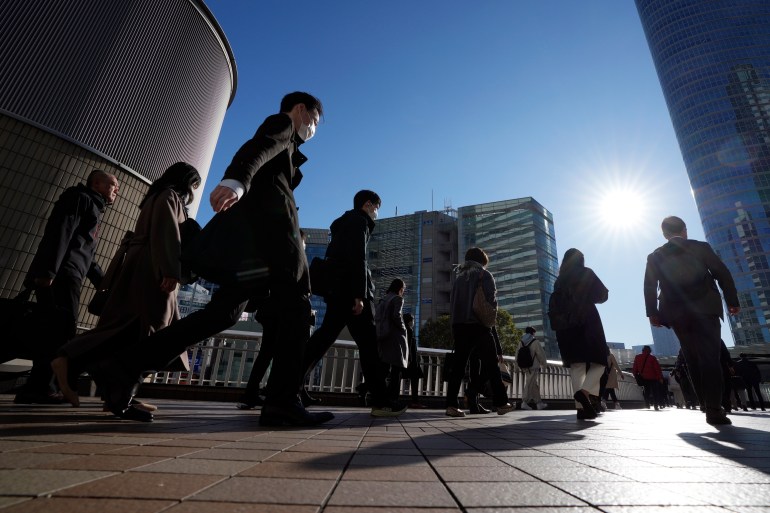Tokyo Japan – For foreigners in Japan, permanent residency has long been a sought-after guarantee of security in a country that has historically avoided mass immigration.
But Tokyo's proposals to cancel permanent residency status for those who don't pay their taxes and social security contributions are now calling that security into question, sparking unease among some long-time foreign residents.
Ben Shearon, a British native who has lived in Japan for almost 24 years, is among those questioning the logic behind the proposed changes to immigration law.
A permanent resident, Shearon retired in 2022 and now spends most of his time working on his website RetireJapan, where he offers training and financial advice to Japan's expat population.
“I'm not worried about my own status in Japan. “I have paid all my taxes and have also been contributing to the national health insurance and public pension in Japan since I arrived,” Shearon told Al Jazeera.
“My main issue right now is that the headlines seem to feed a narrative that foreign residents, especially permanent residents, are not paying their fair share.”
Under the standard process for obtaining permanent residency, applicants must have lived in Japan for at least 10 years and have had a work visa for five of those years.
But since 2017, foreign residents have been able to speed up the process to as little as one year if they score highly on a points-based assessment that looks at work experience, salary, academic qualifications, age and Japanese language proficiency.
The law also states that a foreigner's permanent residence must be in the best interests of Japan, including the payment of taxes, pension contributions and health insurance premiums.
Currently, the government can only revoke a person's permanent residency under a limited set of circumstances, including being sentenced to more than a year in prison.
Under the proposals, authorities could cancel resident visas for non-payment of taxes and prison sentences of less than a year.
'Small minority'
Shearon, like other foreign-born residents, is concerned that the proposals will single out non-Japanese citizens for special scrutiny.
“I am also not in favor of creating new sanctions that only apply to foreigners when we already have laws and consequences for not paying taxes that apply to everyone in Japan equally,” he said.
“If not paying health insurance or pension is a major problem in Japan, then surely the way to address it is to strengthen enforcement for everyone, not just focus on a small number of a small minority.”
Permanent residence visa holders currently number about 880,000 in Japan, less than one percent of the population.
Since the announcement of the proposals last month, foreign residents reacting to the plans have generally divided into one of two camps.
While some see Prime Minister Fumio Kishida's administration stoking xenophobia, others have scoffed at the suggestion that foreigners are being singled out, arguing that tax evaders should be punished and that only those who seek to game the system have something to fear.
“What are these gaijin complaining about? If you already pay your taxes, congratulations. You have nothing to worry about,” Oliver Jia, a researcher and writer based in Kyoto, said on X in response to a publication that denounced the proposals as discriminatory.
“Do these people realize that permanent residency by default means you have fewer rights than citizens? “This is how practically every country in the world works,” Jia added.
“Japan is not going to do everything it can for you, especially since you have decided that you do not want to pay taxes. Unhinged.”
Austin Smith, public policy manager at GR Japan, a politically neutral government relations and advisory firm, said the proposed amendment would dilute permanent residency status, but only to a point.
“PR visa revocation will likely remain a rarity, but will be more common than under the current system,” Smith told Al Jazeera.
“Still, even a slight increase in the likelihood of having PR status revoked will surely worry foreign residents, many of whom have built their lives around Japan.”
Smith said he believed the measures would likely only apply to those who knowingly committed tax evasion or crimes that resulted in prison.
“However, there is concern that this could impact those who are unable to pay taxes due to job loss or other factors,” Smith said. “Or that it could be expanded in the future to allow revocations for offenses that result in fines.”

The move comes despite Japan's efforts to attract more immigrants as it faces a rapid decline in its population.
In recent years, municipalities across Japan have simplified the visa process for new business owners and business managers.
Later this month, Tokyo will launch a new digital nomad visa, aimed at remote workers from 49 countries who earn more than 10 million yen a year.
Japan's foreign training program, which has often been maligned as a cover for importing cheap labor since its introduction in 1993, is undergoing a major overhaul to ease the transition to holding a skilled work visa and, eventually, permanent resident.
In late February, the government also relaxed visa regulations to allow more foreign students to find work in Japan after they have completed their studies.
According to official forecasts, Japan's population is on track to shrink from about 125 million to less than 80 million by 2070.
Policymakers see higher levels of immigration as a way to replenish the workforce and prevent a further slowdown in the country's already meager economic growth rate.
Smith said he sympathizes with the need for more immigrants, but does not see the proposed changes to permanent residency rules as necessarily in conflict with Japan's shift toward pro-immigration policies.
“The goal here for lawmakers appears to be to align the conditions for revoking PR visas with the guidelines for securing PR status,” he said.
“[But]I believe that Japan needs to make immigration more accessible to curb some of the negative impacts caused by an aging society… Japan will need to ensure that its labor market is attractive to a wide range of potential foreign workers and that its immigration system be flexible. and welcoming.”












